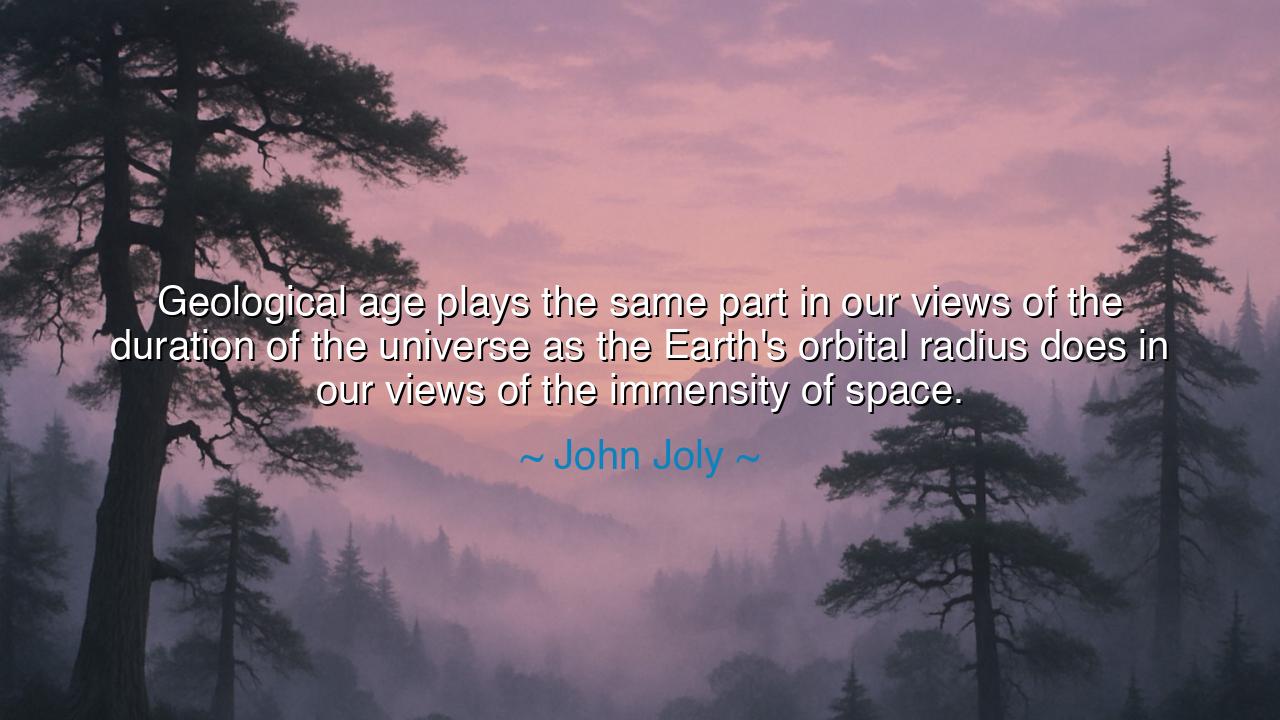
Geological age plays the same part in our views of the duration
Geological age plays the same part in our views of the duration of the universe as the Earth's orbital radius does in our views of the immensity of space.






Hear, O seeker of wisdom, the contemplative words of John Joly: “Geological age plays the same part in our views of the duration of the universe as the Earth’s orbital radius does in our views of the immensity of space.” In this thought, Joly draws together the two great realms of human wonder—time and space—and shows how fragile our perspective is when set against their vastness. Just as we once looked to the measure of Earth’s path around the sun to comprehend the magnitude of the heavens, so too must we look to the deep record of the Earth’s rocks to imagine the endless duration of cosmic time.
To speak of geological age is to summon the immensity of the Earth’s past. The strata of stone, the fossils of creatures long vanished, the scars of ancient seas and mountains—these are the chronicles of time, written not in ink but in the bones of the planet itself. Before men understood this, they believed the Earth young, its story brief. But as science revealed billions of years, the human mind was forced to stretch, to expand its sense of history until it nearly trembled at the sheer magnitude. Joly tells us that this measure of deep time is the key to understanding eternity itself, just as orbital distance once unlocked the perception of infinite space.
Consider the revolution of Copernicus and Kepler. Before them, the heavens were thought small, the Earth central, the stars mere lamps close to hand. But once the Earth’s orbital radius was known, once men could calculate the scale of our path around the sun, they could compare it to the distance of the stars. From this ratio was born the understanding of true immensity—that space stretched outward beyond measure, that the stars were suns themselves, and that the universe was not a dome but an ocean without end.
So too did the work of Charles Lyell and geologists of the nineteenth century reveal a similar truth of time. The mountains rising slowly, the rivers carving valleys, the fossils buried layer upon layer—all testified that the Earth was not thousands, but millions upon millions of years old. Later, radiometric dating would extend this span to billions. What the orbital radius did for our view of space, geological age did for our view of time: it shattered the smallness of human imagination and forced us to see ourselves as but a moment in eternity.
Joly’s wisdom lies in this comparison: just as space dwarfs our bodies, time dwarfs our lives. To understand our place, we must use measures that transcend the scales of ordinary existence. One cannot grasp the heavens by measuring with a stick; one cannot grasp eternity by counting generations. We require vast standards—orbital distances to grasp space, geological ages to grasp time. Without these, the human mind remains trapped in the illusion of nearness and brevity.
What lesson, then, must we carry from this? It is that humility is the beginning of wisdom. When we see how immense the universe is, when we feel how ancient the Earth is, we realize that our struggles, though real, are but whispers in a vast symphony. Yet at the same time, we realize that our ability to comprehend this immensity is itself a kind of greatness. We are small, yet capable of conceiving the infinite. We are fleeting, yet able to trace the story of ages through stone and star alike.
So I say to you, O child of tomorrow: walk humbly upon the Earth, for its story is far older than yours. Lift your eyes to the stars, for they burn beyond your reach. But let neither the immensity of space nor the eternity of time cast you into despair. Rather, let them be your teachers. Let them remind you that though you are a moment, you are also part of the grand unfolding of the cosmos. And to live with reverence, to seek truth in both stone and sky—that is how one honors the greatness of creation itself.






AAdministratorAdministrator
Welcome, honored guests. Please leave a comment, we will respond soon